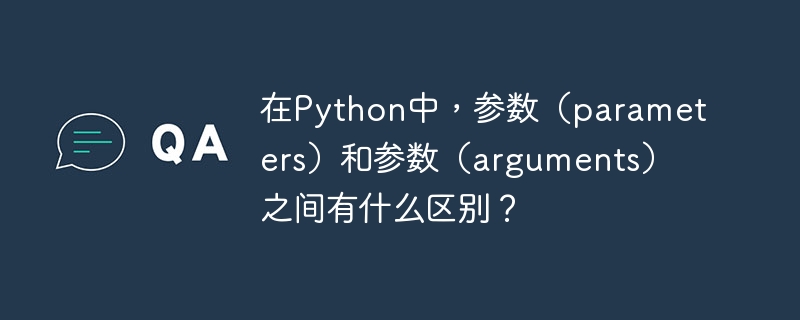 Backend Development
Backend Development
 Python Tutorial
Python Tutorial
 In Python, what is the difference between parameters and arguments?
In Python, what is the difference between parameters and arguments?
In Python, what is the difference between parameters and arguments?

The concept of arguments and arguments is part of functions in Python. So, before continuing, let's learn how to create a function and functions with parameters.
A function is an organized, reusable piece of code that performs a single, related operation. Functions provide your application with better modularity and a high degree of code reusability.
Create a function
The Chinese translation ofExample
is:Example
Let’s create a basic function −
# Define a function
def sample():
print("Inside a Function")
# Function call
sample()
Output
Inside a Function
Create a function with parameters
Here, we are creating a function with parameters −
# Creating a Parameterised Function
def sample(str):
print("Car = ", str)
# Function calls
sample("Tesla")
sample("Audi")
sample("BMW")
sample("Toyota")
Output
('Car = ', 'Tesla')
('Car = ', 'Audi')
('Car = ', 'BMW')
('Car = ', 'Toyota')
parameter
Parameters are defined by their names as they appear in the function definition. Parameters define the types of arguments a function can accept. So, based on the above example of a function with parameters, the following is one parameter, which is str −
# Function Definition def sample(str):
parameter
Parameters are the values actually passed to the function when it is called. So, based on the above example of a function with parameters, the following are the parameters, namely Tesla, Audi, BMW and Toyota−
# Function calls
sample("Tesla")
sample("Audi")
sample("BMW")
sample("Toyota")
Example
is:Example
Let’s see an example -
# Function Definition
def sample(name, rank):
print("Employee Name = ",name)
print("Employee Rank = ",rank)
# Function call
sample(rank = 3,name = "Tim")
Output
Employee Name = Tim Employee Rank = 3
Above, name and rank are parameters of the sample() function.
The3 and Tim parameters of the sample() function.
Let's look at another example where we have **kwargs and a parameter −
def func(foo, bar=None, **kwargs): pass
Output
func(10, bar=20, extra=somevar)
Above, foo, bar, and kwargs are the parameters of func().
the values 10, 20, and somevar are arguments of the func().
The above is the detailed content of In Python, what is the difference between parameters and arguments?. For more information, please follow other related articles on the PHP Chinese website!

Hot AI Tools

Undresser.AI Undress
AI-powered app for creating realistic nude photos

AI Clothes Remover
Online AI tool for removing clothes from photos.

Undress AI Tool
Undress images for free

Clothoff.io
AI clothes remover

Video Face Swap
Swap faces in any video effortlessly with our completely free AI face swap tool!

Hot Article

Hot Tools

Notepad++7.3.1
Easy-to-use and free code editor

SublimeText3 Chinese version
Chinese version, very easy to use

Zend Studio 13.0.1
Powerful PHP integrated development environment

Dreamweaver CS6
Visual web development tools

SublimeText3 Mac version
God-level code editing software (SublimeText3)

Hot Topics
 1387
1387
 52
52
 How to solve the permissions problem encountered when viewing Python version in Linux terminal?
Apr 01, 2025 pm 05:09 PM
How to solve the permissions problem encountered when viewing Python version in Linux terminal?
Apr 01, 2025 pm 05:09 PM
Solution to permission issues when viewing Python version in Linux terminal When you try to view Python version in Linux terminal, enter python...
 How to efficiently copy the entire column of one DataFrame into another DataFrame with different structures in Python?
Apr 01, 2025 pm 11:15 PM
How to efficiently copy the entire column of one DataFrame into another DataFrame with different structures in Python?
Apr 01, 2025 pm 11:15 PM
When using Python's pandas library, how to copy whole columns between two DataFrames with different structures is a common problem. Suppose we have two Dats...
 How to teach computer novice programming basics in project and problem-driven methods within 10 hours?
Apr 02, 2025 am 07:18 AM
How to teach computer novice programming basics in project and problem-driven methods within 10 hours?
Apr 02, 2025 am 07:18 AM
How to teach computer novice programming basics within 10 hours? If you only have 10 hours to teach computer novice some programming knowledge, what would you choose to teach...
 How to avoid being detected by the browser when using Fiddler Everywhere for man-in-the-middle reading?
Apr 02, 2025 am 07:15 AM
How to avoid being detected by the browser when using Fiddler Everywhere for man-in-the-middle reading?
Apr 02, 2025 am 07:15 AM
How to avoid being detected when using FiddlerEverywhere for man-in-the-middle readings When you use FiddlerEverywhere...
 How does Uvicorn continuously listen for HTTP requests without serving_forever()?
Apr 01, 2025 pm 10:51 PM
How does Uvicorn continuously listen for HTTP requests without serving_forever()?
Apr 01, 2025 pm 10:51 PM
How does Uvicorn continuously listen for HTTP requests? Uvicorn is a lightweight web server based on ASGI. One of its core functions is to listen for HTTP requests and proceed...
 What are some popular Python libraries and their uses?
Mar 21, 2025 pm 06:46 PM
What are some popular Python libraries and their uses?
Mar 21, 2025 pm 06:46 PM
The article discusses popular Python libraries like NumPy, Pandas, Matplotlib, Scikit-learn, TensorFlow, Django, Flask, and Requests, detailing their uses in scientific computing, data analysis, visualization, machine learning, web development, and H
 How to dynamically create an object through a string and call its methods in Python?
Apr 01, 2025 pm 11:18 PM
How to dynamically create an object through a string and call its methods in Python?
Apr 01, 2025 pm 11:18 PM
In Python, how to dynamically create an object through a string and call its methods? This is a common programming requirement, especially if it needs to be configured or run...
 How to solve permission issues when using python --version command in Linux terminal?
Apr 02, 2025 am 06:36 AM
How to solve permission issues when using python --version command in Linux terminal?
Apr 02, 2025 am 06:36 AM
Using python in Linux terminal...



